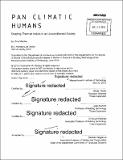Pan climatic humans : shaping thermal habits in an unconditioned society
Author(s)
Mackey, Chris (Christopher William)
DownloadFull printable version (65.16Mb)
Other Contributors
Massachusetts Institute of Technology. Department of Architecture.
Advisor
Skylar Tibbits, Christoph Reinhart and Leslie Norford.
Terms of use
Metadata
Show full item recordAbstract
The relationship between people and the thermal environment has a profound impact on lifestyle and culture, influencing what we wear, what spaces we gather around, and how we go about our lives. Yet this relation is often oversimplified in the design of conditioned spaces, assuming occupants have unchanging thermal preferences and no desire to participate in the shaping of a building's microclimates. While we gain a basic satisfaction of thermal need from this simplified view, we lose much by complicating our buildings with HVAC equipment to the point that inhabitants do not understand them, by cellularizing space into bubbles of conditioned air that limit opportunities for continuous communal space, and by having occupants rely on central heating/cooling systems that often require harmful concentrated energy sources, such as fossil fuels. This thesis asks if and how we can design spaces of everyday life that not only satisfy a basic thermal need but also encourage occupant participation in the shaping of microclimates, promote thermally-based social cohesion, and do so using only on passive means. Since the traditional process of evaluating heating/cooling load with an energy model does not hold for unconditioned design, the thesis question requires a new method for exploring design decisions in relation to the thermal environment. Accordingly, research began by developing software to produce high spatial/temporal resolution thermal maps that evaluate design decisions by indicating the parts of a space made warmer or cooler in relation to a seasonal "comfort temperature." With this new means of understanding the thermal environment, several geometric design strategies are tested for two climates - Los Angeles and New York. The tests illustrate that the geometry of a space can have an enormous effect on its thermal habitability once the assumptions of air conditioning and oversimplified occupants are removed. The most powerful of the tested design strategies are used to develop two completely passive urban co-habitation/co-working projects that express and embellish these discovered geometric factors. The designs operate off of a generalizable logic in which the communal, daytime spaces are placed in the areas of a site where they can take advantage of the most powerful and stable thermal strategies while the fringes include less stable, intermittently- occupied, private spaces where occupants can tune the microclimate as they wish. Although this generalizable logic is constant, the two designs illustrate that widely different forms can emerge based on the climate and the tested strategies.
Description
Thesis: M. Arch., Massachusetts Institute of Technology, Department of Architecture, 2015. Thesis: S.M., Massachusetts Institute of Technology, Department of Architecture, 2015. Cataloged from PDF version of thesis. Includes bibliographical references (pages 144-147).
Date issued
2015Department
Massachusetts Institute of Technology. Department of ArchitecturePublisher
Massachusetts Institute of Technology
Keywords
Architecture.